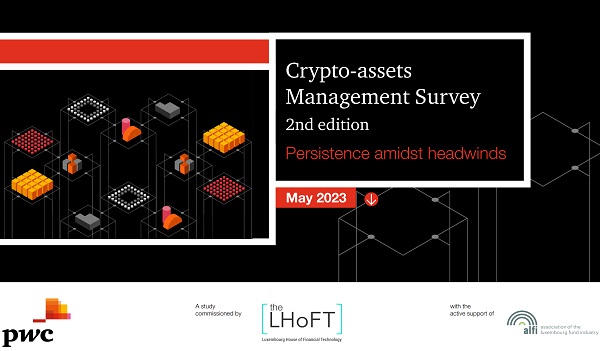 Credit: LHoFT/PwC/ALFI
Credit: LHoFT/PwC/ALFI
On Thursday 25 May 2023, the Luxembourg House of Financial Technology (LHoFT), together with PwC Luxembourg and with the support of the Association of the Luxembourg Fund Industry (ALFI), jointly announced the publication of the second edition of the Crypto-Assets Management Survey, entitled "Crypto-Assets in Luxembourg: Persistence Amidst Headwinds".
The report provides a deep dive into the state of the crypto-assets market in the Grand Duchy after a year filled with global shocks.
A total of 127 industry practitioners responded to the survey conducted in the first quarter of 2023 - up from 123 participants in the previous edition carried out in the fourth quarter of 2021. Respondents primarily worked in asset and wealth management, depositary services, fund administration, legal services and other asset servicing activities.
While 2021 was considered an strong year of post-pandemic recovery for crypto-assets, according to the authors, 2022 was quite the opposite. Macroeconomic and geopolitical shocks led to severe economic downturns worldwide, while a series of governance failures across the global crypto-assets industry severely harmed the novel asset class' reputation and promise.
Against this rapidly changing landscape, the LHoFT commissioned a new edition of the Crypto-Assets Management Survey to assess how the views of stakeholders in Luxembourg's asset management industry have evolved regarding crypto-assets.
The report highlights the views of Luxembourg market participants towards crypto-assets, the Grand Duchy’s position, the obstacles, challenges and constraints to crypto-assets development, and the role crypto-assets will play in the coming years. It also includes various recommendations aimed at helping enhance and clarify how stakeholders in the Luxembourg financial sector should approach crypto-assets amid an environment of new regulatory developments.
Some of the main findings were as follows:
- 39% of respondents believed the global crypto-assets market was still in its early stages and had significant potential (a similar finding to the first edition of the survey), while 33% saw it as reaching an inflection point towards broader adoption and maturity; 36% believed that crypto-assets' performance did not meet expectations;
- recent shocks to the global crypto-assets market have not significantly discouraged stakeholders in Luxembourg, as 34% viewed these events as the consequence of corporate governance and due diligence failures, while 23% saw the current moment as an opportunity to rebuild;
- while only 19% of respondents considered Luxembourg to be a leading jurisdiction in the crypto-assets space globally, the Grand Duchy ranked ahead of both the UK (11%) and France (10%) in the survey; the US (69%), Switzerland (50%) and Signapore (37%) were considered the global leaders;
- 82% of respondents considered it from somewhat to extremely important for Luxembourg to take a more active stance in the broad crypto-assets space;
- one-third of respondents believed regulations such as the Markets in Crypto Assets (MiCA) EU Regulation to be a critical prerequisite for industry development, while 17% said they were carefully considering such regulations when developing their value proposition and products;
- 71% of respondents believed crypto-assets would be from somewhat to extremely important for the future of asset management in Luxembourg.
Moreover, the report found the main constraints to broader crypto-assets adoption in Luxembourg to be a lack of maturity of relevant market infrastructures, the high volatility of crypto-assets and the high anti-money laundering (AML) risks perceived to be inherent to the asset class.
Nonetheless, almost a quarter of respondents saw high potential in crypto-assets from an investment strategy perspective, while 34% saw some potential. The diversification benefits of crypto-assets continued to be viewed as their most attractive feature, whereas their perception as an inflation hedge has suffered.
Looking forward, most respondents viewed a strengthening of investor education as imperative in terms of investor/customer protection while another quarter agreed that there is a need to strengthen financial education around the topic without having strong views on a particular approach.
Commenting on these findings, LHoFT Foundation CEO Nasir Zubairi said: "With every challenge comes an opportunity for growth and transformation. The findings of our Crypto-Assets Management Survey reveal that Luxembourg's financial centre remains open to and opportunistic with innovation. I am invigorated by the evolving perceptions and the potential for developments in relation to crypto-assets in Luxembourg."
Steven Libby, EMEA Asset & Wealth Management Leader at PwC Luxembourg, noted: "In my role as ALFI co-chair of the Digital/FinTech Forum, I continue to observe a sustained interest in crypto-assets and a very robust exchange between market players and the regulator to ensure that the required governance, policies and procedures are in place to support the eventual growth in this area."
Thomas Campione, CFA Director and Blockchain & Crypto-assets Leader at PwC Luxembourg, added: "While the value proposition of crypto-assets has not changed, the events of 2022 clearly impacted market participants' trust which must now be rebuilt. So far markets have shown resilience in 2023 and it is now up to the crypto-asset industry to prove itself. Time has come for a reset and the entry into force of MiCA will certainly act as a catalyst here."
Gildas Blanchard, Head of Industry Affairs at ALFI, concluded: "The 2023 crypto-assets management survey helps to gauge the underlying demand and also highlights the dynamics of a maturing regulatory framework. While further enhancing regulatory clarity and connecting the dots across the fund value chain remain priorities, translating ideas into concrete operational set-ups will be one of the key challenges in 2024. We are enthusiastic about what is to come and ready to play our role."
The full report can be downloaded from https://lhoft.com/en/crypto-assets-management-survey-2023/.








